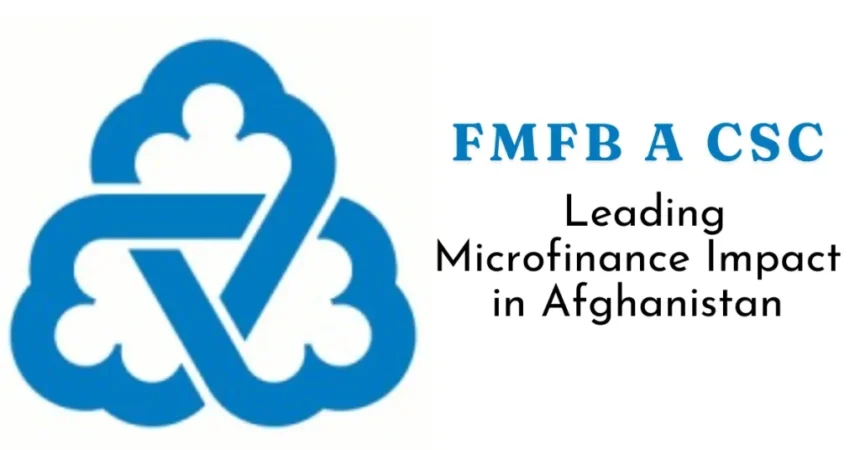In the rugged terrain and economically challenging environment of Afghanistan, microfinance has emerged as a beacon of hope for many. At the forefront of this movement is FMFB A CSC (First MicroFinance Bank Afghanistan, A Company of the Swiss Capacity Building Facility). This institution has become a pivotal player in transforming the economic landscape for countless Afghan families. By providing crucial financial services, FMFB A CSC is not just supporting individual businesses but contributing to the broader economic resilience of the country. This article explores the importance of microfinance in Afghanistan, the specific impact of FMFB A CSC, and the future of microfinance in the region.
The Importance of Microfinance in Afghanistan
Microfinance has proven to be a powerful tool in alleviating poverty and fostering economic development, especially in developing countries. In Afghanistan, where many communities face economic instability and limited access to traditional financial services, microfinance institutions like FMFB A CSC offer a lifeline. Microfinance provides small loans, savings accounts, and other financial services to individuals who lack access to conventional banking. This support is critical in enabling entrepreneurs, particularly women and marginalized groups, to start and expand businesses, thereby creating jobs and stimulating local economies.
FMFB’s Impact on the Afghan Community
FMFB A CSC plays a significant role in the Afghan microfinance landscape. Established with the mission to provide accessible financial services to underserved populations, FMFB A CSC has reached thousands of individuals and small businesses across Afghanistan. The bank’s efforts are not only aimed at providing financial resources but also at fostering a culture of financial inclusion and economic self-sufficiency.
One of the key impacts of FMFB A CSC is its contribution to financial inclusion. By offering loans and financial services in areas where traditional banks are absent, FMFB A CSC helps bridge the gap between the formal financial sector and the underserved communities. This inclusion allows individuals to secure capital for their ventures, manage risks, and build credit histories, which are essential for long-term economic stability.
Programs and Services Offered by FMFB A CSC
FMFB A CSC offers a range of programs and services designed to meet the diverse needs of its clients. These include:
- Microloans: Small loans tailored for individuals or small businesses that lack access to traditional banking services. These loans help clients start or expand their businesses, improve their homes, or invest in education.
- Savings Accounts: FMFB A CSC provides safe and accessible savings accounts, which are essential for individuals and families to build financial security and plan for the future.
- Insurance Products: To mitigate risks associated with health, property, and other uncertainties, FMFB A CSC offers insurance products that provide clients with a safety net.
- Financial Education: Recognizing that financial literacy is crucial for effective money management, FMFB A CSC offers training and workshops to educate clients on budgeting, savings, and investment.
- Business Development Services: The bank supports entrepreneurs with training and advisory services to help them grow their businesses, enhance their skills, and improve their business practices.
Schedule of Charges for FMFB A CSC
The Schedule of Charges for FMFB A CSC (First MicroFinance Bank Afghanistan, A Company of the Swiss Capacity Building Facility) outlines the fees and charges associated with the various financial services provided by the institution. This schedule is designed to offer transparency and help clients understand the costs involved in utilizing FMFB A CSC’s services. Below is a detailed overview of the charges applicable to different types of accounts and services.
1. Savings Accounts
- Account Opening Fee: No charge
- Monthly Maintenance Fee: Free for the first 6 months, after which a nominal fee of AFN 50 per month is applicable
- Minimum Balance Requirement: AFN 500 (If balance falls below this threshold, a fee of AFN 25 per month will be charged)
- Withdrawal Fee: Free for the first 5 withdrawals per month; subsequent withdrawals incur a fee of AFN 20 per transaction
- Over-the-Counter Transactions: AFN 30 per transaction (excluding withdrawals)
- Statement Issuance Fee: AFN 50 per request (for physical statements; electronic statements are free)
2. Microloans
- Loan Processing Fee: 1% of the loan amount, capped at AFN 500
- Late Payment Fee: 2% of the overdue amount per month
- Prepayment Fee: No prepayment penalty
- Early Settlement Fee: 1% of the remaining loan balance (if settled before 6 months)
- Insurance Fee: 0.5% of the loan amount (included in the loan amount and payable upfront)
3. Business Loans
- Loan Processing Fee: 1.5% of the loan amount, capped at AFN 1,000
- Late Payment Fee: 2% of the overdue amount per month
- Prepayment Fee: No prepayment penalty
- Early Settlement Fee: 1% of the remaining loan balance (if settled before 12 months)
- Insurance Fee: 1% of the loan amount (included in the loan amount and payable upfront)
Success Stories of Beneficiaries
The true measure of FMFB A CSC’s impact lies in the success stories of its beneficiaries. For instance, consider the story of Fatima, a small-scale farmer from rural Afghanistan. With a microloan from FMFB A CSC, Fatima was able to purchase seeds and modern farming tools, which significantly increased her crop yield. Her success not only improved her family’s financial situation but also contributed to the local economy by supplying produce to nearby markets.
Another inspiring story is that of Ahmed, a young entrepreneur who received financial support to open a small retail shop. The loan allowed Ahmed to stock his shop with essential goods and hire local staff. His business has since flourished, providing jobs and generating income for his community.
Challenges and Solutions for Microfinance in Afghanistan
Despite its significant impact, microfinance in Afghanistan faces several challenges:
- Security Concerns: The ongoing conflict and security issues in Afghanistan pose risks for both clients and institutions. These challenges can disrupt operations and affect the delivery of financial services.
- Infrastructure Limitations: Many regions lack the necessary infrastructure for effective financial transactions, including reliable communication and transportation networks.
- Cultural Barriers: In some areas, traditional beliefs and practices may hinder the acceptance and utilization of microfinance services, particularly for women.
To address these challenges, FMFB A CSC has implemented various solutions. The bank has developed mobile banking services to reach clients in remote areas and minimize security risks. Additionally, FMFB A CSC collaborates with local communities and leaders to foster trust and ensure that its services are culturally appropriate and widely accepted.
Looking Towards the Future: Expanding Microfinance Impact in Afghanistan
As Afghanistan continues to navigate its complex socio-economic landscape, the role of microfinance institutions like FMFB A CSC will be increasingly vital. The bank is committed to expanding its reach and enhancing its services to better serve the needs of Afghan communities. Future plans include increasing the number of branches and service points, introducing innovative financial products, and strengthening partnerships with local organizations and international donors.
The goal is to build on the existing success and create a more inclusive financial ecosystem that supports sustainable economic growth and resilience.
FAQs
1. What is FMFB A CSC? FMFB A CSC (First MicroFinance Bank Afghanistan, A Company of the Swiss Capacity Building Facility) is a microfinance institution providing financial services to underserved populations in Afghanistan.
2. How does FMFB A CSC support its clients? FMFB A CSC offers microloans, savings accounts, insurance products, financial education, and business development services to help clients start and grow businesses, manage risks, and improve their financial well-being.
3. What are the main challenges facing microfinance in Afghanistan? Challenges include security concerns, infrastructure limitations, and cultural barriers. FMFB A CSC addresses these issues through mobile banking, community engagement, and culturally sensitive services.
4. How can FMFB A CSC expand its impact in the future? FMFB A CSC plans to expand its network, introduce new financial products, and strengthen partnerships to enhance its services and reach more communities across Afghanistan.
Conclusion
FMFB A CSC stands as a testament to the transformative power of microfinance in Afghanistan. By providing essential financial services to those who need them most, FMFB A CSC not only supports individual entrepreneurs and families but also contributes to the broader economic development of the country. As Afghanistan continues to face challenges and opportunities, the work of institutions like FMFB A CSC will be crucial in fostering a more inclusive and resilient economy. Through dedication and innovation, FMFB A CSC is paving the way for a brighter financial future for countless Afghans.







